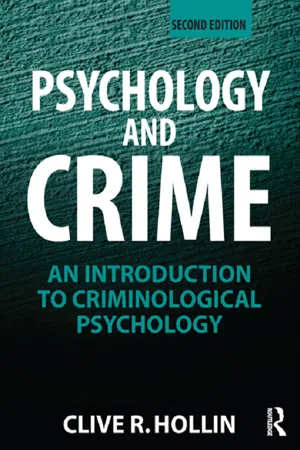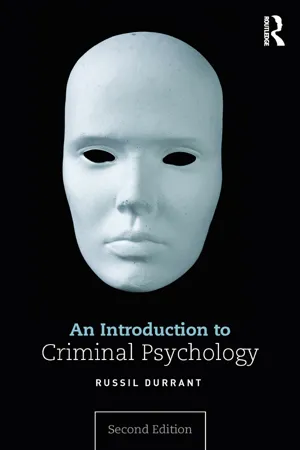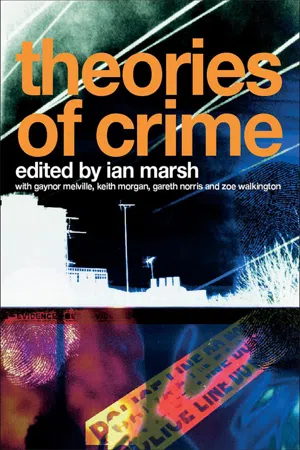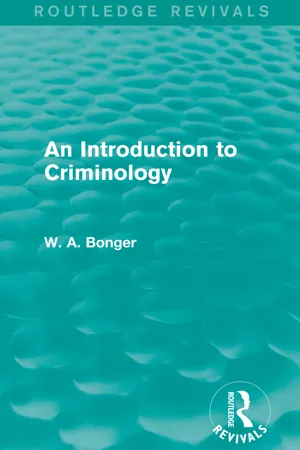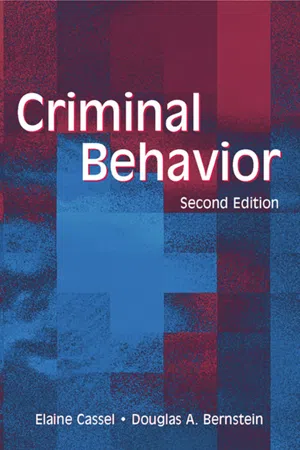Criminal Psychology
Criminal psychology is the study of the thoughts, feelings, and behaviors of individuals who have committed crimes. It involves understanding the psychological factors that contribute to criminal behavior, as well as assessing and treating offenders. Criminal psychologists often work within the criminal justice system to provide insights into criminal behavior and help with the rehabilitation of offenders.
8 Key excerpts on "Criminal Psychology"
- eBook - ePub
Psychology and Crime
An Introduction to Criminological Psychology
- Clive R. Hollin(Author)
- 2013(Publication Date)
- Routledge(Publisher)
...Therefore,criminological psychology, as the term is used here, refers to psychological knowledge applied to the study of criminal behaviour and the various agencies charged with its management.In a broader sense, criminological psychology also refers to the point of contact between the disciplines of criminology and psychology. The relationship between these two disciplines has not always been cordial, although each has something to learn from the other. Hayward (2005) gives a criminologist’s view on the interface between criminology and psychology, Hollin (2007) gives the opposite perspective. In the chapters that follow, the overlap between the two disciplines will become even clearer.Chapter summary• The study of crime engages a range of academic disciplines of which psychology is but one among many.• Psychology has a long history, dating back to Sigmund Freud and psychoanalytic theory, of concern with criminal behaviour.• A precise definition of ‘crime’ is hard to find. An appreciation of the concept of crime relies on how a society, which constructs its own rules and criminal justice system, is understood. We now take it that a crime has two elements:actus reus, the guilty act; andmens rea, the guilty mind.• The exceptions to themens rearequirement are to be found in the age of criminal responsibility, a child below the age at which we become responsible for our actions cannot commit a crime; and in mental health law when a disturbance of the mind casts doubt over the individual’s fitness to stand trial.• The methods using to determine the guilt or innocence of a person accused of crime have varied over the centuries, including trial by ordeal and trial by combat, and invariably harsh punishments were bestowed on the guilty...
- eBook - ePub
- David Canter(Author)
- 2017(Publication Date)
- Routledge(Publisher)
...The related social science disciplines that deal with aspects of criminality and the law are drawn on to understand the context and significance of offence behaviour. In addition, there are related areas of study that consider the forensic traces criminals leave, whether it be where crimes occur or aspects of the chemistry or physics of a crime. These traces can inform the understanding of the patterns of criminal behaviour. FIGURE 1.2 Showing many of the disciplines that contribute to the study of the psychology of crime and criminals. EXPLANATIONS OF CRIME It is out of the differentiation of crimes and criminals that the various forms of psychological explanations of criminality emerge. An important point to get clear from the start is that there is no evidence that mental illness is the cause of criminality. The complexity and variety of criminal activity indicates that it is very unlikely that crime is produced by mental illness or, more generally, mental disorder. The emphasis that some psychologists, such as Blackburn (1994), give to mental problems in criminals is partly a product of their focus being on clinical populations. This has also meant that the aspect of the examination of criminals that emphasises a clinical psychological or psychiatric perspective has tended to be biased towards rather extreme and unusual subsets of criminals. In essence, the people studied by clinicians have been those who have been referred for treatment. They, therefore, are likely to be people who are obviously mentally disturbed or whose crimes have bizarre or extreme qualities to them, such as serial rape, or serial arson or serial homicide. The clinical focus has produced the rather distorted picture that much of the psychological literature on offending is devoted to violent criminals and those whose actions are extreme and rare...
- eBook - ePub
- Russil Durrant(Author)
- 2018(Publication Date)
- Routledge(Publisher)
...Psychology here refers to the academic discipline of psychology (which includes the study, among other things, of brain processes, development, cognition, personality, social influence, and culture) not just peoples’ thinking process and personality (as in the psychological level of analysis discussed below). Unfortunately, although there is some agreement regarding the boundaries of ‘psychology’ and ‘criminology’, there is no such consensus on what is meant by ‘Criminal Psychology’, and there are a number of overlapping terms that are also employed including ‘forensic psychology’ ‘psychological criminology’, ‘criminological psychology’, and ‘legal psychology’. For some (e.g., Blackburn, 1996), the term ‘forensic psychology’ refers specifically to the application of psychology to the legal system – as reflected in the etymology of the word ‘forensic’, as ‘pertaining to the courts of law’. Other scholars offer a more narrow interpretation of ‘forensic psychology’ as the ‘practice of clinical psychology to the legal system’ (Huss, 2009, p. 5). To complicate matters, the term ‘forensic psychology’ is also used more broadly to embrace the application of psychology to virtually anything related to crime, including our understanding of the causes of crime. Davies, Hollin, and Bull (2008, p...
- eBook - ePub
Criminal Psychology
A Beginner's Guide
- Ray Bull, Claire Cooke, Ruth Hatcher(Authors)
- 2009(Publication Date)
- Oneworld Publications(Publisher)
...It will guide you through the criminal justice process and provide a brief overview of how criminal psychologists may contribute their expertise at each stage. Further and more in-depth information can be found in the following chapters. What is criminal/forensic psychology? The term ‘Criminal Psychology’ has been defined in a number of different ways. Even today there is no accepted definition. For example, ten years ago two leading criminal psychologists in the UK defined it as ‘that branch of applied psychology which is concerned with the collection, examination and presentation of evidence for judicial purposes’ (Gudjonsson and Haward 1998, p. 1). It would seem from this explanation that Criminal Psychology is concerned with investigative (those to do with the police) and court processes. However, with the growth in the last quarter of a century in the involvement of criminal psychologists in the assessment and treatment of offenders following their sentencing, it would not be surprising if there were some disagreement with a definition which would exclude these groups of professionals from being called criminal psychologists. It would seem therefore that a wider definition of the term is needed. A leading American psychologist has gone some way to provide this. He described Criminal Psychology as ‘any application of psychological knowledge or methods to a task faced by the legal system’ (Wrightsman 2001, p. 2). This more inclusive definition involves the whole of the legal system. As you will see in the coming pages, criminal psychologists can be involved in all areas of the judicial process (including post sentence) and a broad-based definition is needed to encompass all of this work. In 1981 Professor Lionel Haward, one of the UK’s founding fathers of Criminal Psychology, described the four roles that psychologists may perform when they become professionally involved in criminal proceedings...
- eBook - ePub
Psychological Criminology
An Integrative Approach
- Richard Wortley(Author)
- 2011(Publication Date)
- Willan(Publisher)
...1 Introduction What is Psychological Criminology? Psychology is the scientific study of behaviour and mental processes; criminology is the scientific study of crime and criminals. Thus, psychological criminology may be succinctly defined as the scientific study of the behaviour and mental processes that contribute to an understanding of crime and criminals. Beyond this bald definition, the fact that this book is about psychological criminology requires elaboration. It is often said that criminology is not so much a discipline as it is a collection of disciplines, each of which brings a different set of assumptions and explanations to a common concern with crime and criminals. Overwhelmingly, however, sociology has traditionally been the dominant discipline in criminology and most criminological theories are sociological in nature. In the absence of further qualification, criminology is generally interpreted to mean sociological criminology. Sociological criminology examines the question: what is it about society that influences the incidence of crime and the distribution of criminality? Sociological theories are largely concerned with groups or classes of people in society. Sociologists might be interested in how fundamental structures in society contribute to crime, or why it is that society chooses to label certain behaviours as criminal (and not label others). For example, the relationship between social class and crime is largely a sociological issue. So too is the question of why cigarette smoking is legal while marijuana smoking is not. In contrast, psychological criminology addresses the question: what is it about individuals and their experiences that causes them to commit crime and/or to become criminal? Psychologists are concerned with how an individual’s biological make-up, personality, upbringing, thought processes, current circumstances, and so on produce criminal behaviour...
- eBook - ePub
- Ian Marsh, Ian Marsh(Authors)
- 2007(Publication Date)
- Routledge(Publisher)
...CHAPTER 3 Psychological Explanations for Criminal Behaviour INTRODUCTION For many centuries, we have attempted to find out which people are likely to become criminals and what drives certain individuals to commit a particular type of crime in the first place. Over the years psychologists have considered a range of different explanations in order to answer these difficult questions. Some have argued that there may be a genetic explanation which is at the centre of explaining criminal behaviour; others have suggested that it is the environment in which people live which can influence their chance of becoming criminal. At different periods in history these ideas have been prominent in the minds of not only psychologists but also other professionals and the public alike. However nobody has seemingly provided a comprehensive and infallible answer to the question of criminality. This chapter will introduce some of the key theories that psychologists have attempted to use to explain criminal behaviour, such as personality, social factors and cognition. CRIMINALITY AS AN ELEMENT OF PERSONALITY It is common for us to attach labels to criminals and attempt to explain their behaviour through describing them as possessing a certain character trait. For example, it is common to refer to some criminals as ‘psychos’—particularly in films and the newspapers. This type of person is actually called a psychopath and labels such as these have been developed by psychologists to help us understand the different types of personality category that people fit into. Not all of these are criminal, but it is assumed that many criminals possess similar personality characteristics. Clearly there are some important factors to criminality that can be explained by situational and developmental factors, but there is also the psychological element to criminal activity that is relatively unique to that individual...
- eBook - ePub
- W. A. Bonger(Author)
- 2015(Publication Date)
- Routledge(Publisher)
...Chapter VIII On Criminal Psychology DOI: 10.4324/9781315692531-8 Criminal Psychology comprises various departments: (i) the psychology of crime (theory of motives and counter-motives); (ii) the psychology of the criminal; and (iii) that of the other persons involved in the problem (e.g. witnesses). We shall be obliged to confine ourselves here to a brief survey of the history of Criminal Psychology, and to a few observations on the psychology of the criminal in general, and its significance for criminology. 26 The History of Criminal Psychology This history dates from the end of the 'sixties and beginning of the 'seventies of the nineteenth century. It had, however, its precursors. (i) The pre-history of Criminal Psychology. Apart from a few observations made here and there in ancient times, and from what a few great artists—notably, Shakespeare—saw and understood intuitively, the French jurist F. G. de Pitaval (1673-1743) was the first to collect criminal-psychological material, namely, in his work Causes célèbres et intéressantes (1734 et seq.). After this, from 1772-88, F. Richer continued the series, while in Germany, Häring and Hitzig edited Der Neue Pitaval (1842-91), followed later by Der Pitaval der Gegenwart (1903 et seq.). We mentioned these authors previously in another connexion. As is indicated by the tide, only 'interesting cases' were dealt with in this work—i.e. those which interested the reading public though generally not for scientific reasons. The only law cases dealt with were the very big ones, in which 'les plus grands des grands criminels' played a part. Until a comparatively short time ago this remained so, to the great disadvantage of criminology...
- eBook - ePub
- Elaine Cassel, Douglas A. Bernstein(Authors)
- 2007(Publication Date)
- Psychology Press(Publisher)
...Psychological development begins with the shaping of one’s personality, the unique patterns of thinking, feeling, and behaving that develop early on and remain relatively constant throughout one’s life. Personality development is a complex interaction of bio FIGURE 5.5 Early Precursors of Antisocial Personality Disorder. From Abnormal Psychology, by M. T. Nietzel, M. Speltz, E. McCauley, & D. A. Bernstein, 1998, Boston: Allyn & Bacon. Copyright © 1998 by Allyn & Bacon. Reprinted by permission of authors. logical and environmental factors. Certain personality traits, for instance, extroversion, impulsiveness, and aggressiveness, are more associated with criminal behavior than are others. The psychodynamic theories of Freud, Erikson, Sullivan, and the object relations theories explain crime and violence as the result of interpsychic forces. Freud’s approach was more biological, whereas Erikson’s and Sullivan’s emphasized social interactions more. The object relations theories of Klein, Kohut, and Mahler, have focused on maladaptive relationships with caregivers as setting the stage for maladaptive behavior. The learning theories of Skinner and Bandura are helpful in explaining how aggression and violence are acquired through rewards, reinforcement, and the modeling of others. Combinations of poor parenting in which children do not learn to behavior in law-abiding ways and observing aggression and violence in others may lead to criminal offending. Piaget and Kohlberg have helped explain criminal behavior from a cognitive perspective. Piaget has helped us understand how people learn to think and reason generally through the development of cognitive schemas, whereas Kohlberg was concerned with how children and adults engage in moral reasoning and decision making...
